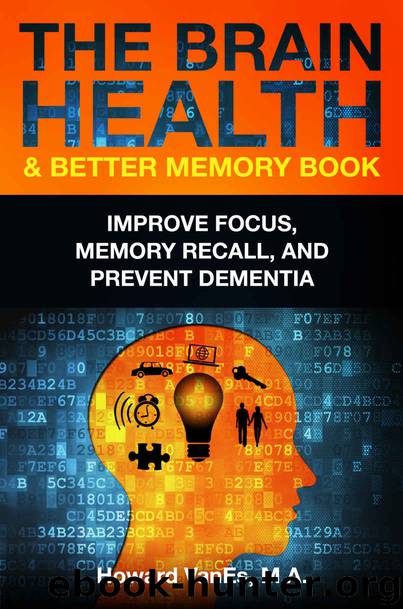The Brain Health & Better Memory Book: Improve Focus, Memory Recall, and Prevent Dementia by Howard VanEs

Author:Howard VanEs [VanEs, Howard]
Language: eng
Format: epub
Publisher: BooksonHealth.net
Published: 2015-01-20T18:30:00+00:00
Another study
that showed people
who lived stressful
lives, that is if they
experienced family
death, hardship, and
depression, were three
times more likely to
develop Alzheimer’s.
After the experiments were completed, the rats were dissected, and their prefrontal cortexes were examined under a microscope. The researchers discovered that the older rats with higher levels of corticosterone had approximately 20 percent fewer synapses in their prefrontal cortexes. This showed a link in corticosterone and memory loss. However, what was also interesting is that older rats that did not have elevated levels of corticosterone showed no signs of memory loss and had their synapses intact. The levels of corticosterone in younger rats did not affect their memory as they all ran the maze with comparable completion percentages. This shows that cortisol’s effect on short-term memory loss may be exacerbated by the age of the subject. In any case, a link between the body’s response to stress and increased cortisol production has now been linked to another negative effect on the brain’s prefrontal cortex, which, in turn, dampens short-term memory.
Unfortunately, increased levels of cortisol caused by stress do not just create the problem of short-term memory loss, but cortisol can also play a role in dementia and Alzheimer’s disease.4 Research conducted at U.C. Irvine has shown a strong link between cortisol and Alzheimer’s disease. It has long been shown that patients who are battling Alzheimer’s have an increased level of cortisol in their blood stream. However, the mechanism by which cortisol played a role in Alzheimer’s formation had yet to be understood.
Alzheimer’s is caused by sticky proteins or plaques that are produced in the brain. These plaques disrupt neural connections and cause the memory loss you see in those diagnosed with Alzheimer’s. There are two types of proteins that are largely responsible for this disruption. The first is called amyloid beta peptide or Ab. The second is referred to as “tau.” Ab will stick in between neurons and while there will cause intercellular plaques and disruptions. Tau actually works inside of a neuron and disrupts a neuron’s typical function. These two proteins work in tandem to cause memory loss, irritability, and mood swings often seen in Alzheimer’s sufferers.
U.C. researchers showed that individual cells, when exposed to increased levels of cortisol, produced more Ab plaques. The next step for the researchers was to test their findings on animals and, in this case, use a genetically modified mouse. This mouse was created to show signs and symptoms of Alzheimer’s disease as it got older. Young mice were given cortisol every day for a weeks’ time before they were old enough to actually show signs of Alzheimer’s disease. A week after injection, the mice were euthanized and dissected. The mice given the injections of cortisol showed that in as little as one week from the time of injections, there was a rapidly elevated production of tau and Ab proteins present. If increased amounts of circulating cortisol in the human body cause the increase in the Alzheimer’s-causing plaques, it would logically show that an increase in cortisol levels could cause an increased risk of Alzheimer’s disease.
Download
This site does not store any files on its server. We only index and link to content provided by other sites. Please contact the content providers to delete copyright contents if any and email us, we'll remove relevant links or contents immediately.
Should I Stay or Should I Go? by Ramani Durvasula(7652)
Why We Sleep: Unlocking the Power of Sleep and Dreams by Matthew Walker(6701)
Fear by Osho(4727)
Flow by Mihaly Csikszentmihalyi(4687)
Rising Strong by Brene Brown(4449)
Why We Sleep by Matthew Walker(4434)
The Hacking of the American Mind by Robert H. Lustig(4375)
How to Change Your Mind by Michael Pollan(4355)
Too Much and Not the Mood by Durga Chew-Bose(4337)
Lost Connections by Johann Hari(4171)
He's Just Not That Into You by Greg Behrendt & Liz Tuccillo(3891)
Evolve Your Brain by Joe Dispenza(3671)
The Courage to Be Disliked by Ichiro Kishimi & Fumitake Koga(3488)
Crazy Is My Superpower by A.J. Mendez Brooks(3398)
In Cold Blood by Truman Capote(3374)
Resisting Happiness by Matthew Kelly(3337)
What If This Were Enough? by Heather Havrilesky(3308)
The Book of Human Emotions by Tiffany Watt Smith(3300)
Descartes' Error by Antonio Damasio(3270)
